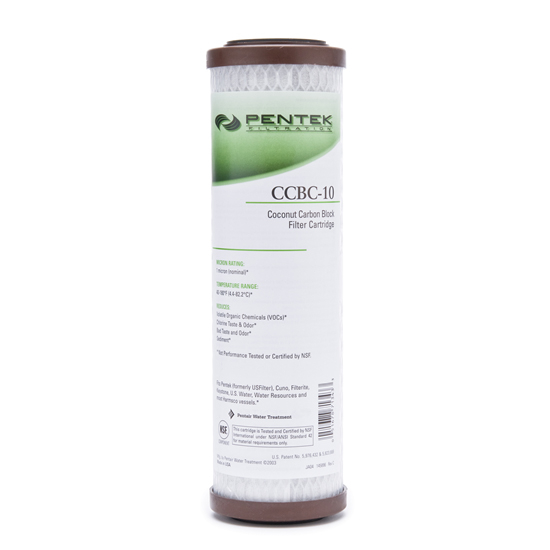Product Description
This Pentek CCBC-10 coconut carbon block filter cartridge reduces fine sediment and chlorine taste and odor in residential and commercial drinking water. It has a nominal (85%) filtration rating of 1 micron. It will reduce free available chlorine (FAC) at 2 parts per million (ppm) by at least 75% in up to 20,000 gallons at a flow rate of 1 gallon per minute (gpm). The cartridge is made of water-washed coconut shell based carbon block media enclosed in a polyolefin wrap pre-filter and polyethylene outer netting. The nitrile butadiene rubber (Buna-N) gaskets seal the cartridge against the housing (sold separately). The filter has an initial pressure drop of 3.3 pounds per square inch (psi) at a recommended flow rate of 1 gpm, and operates over a temperature range of 40 to 125 degrees F (4.4 to 51.7 degrees C). This carbon block filter cartridge meets National Sanitation Foundation/American National Standards Institute (NSF/ANSI) standard 42 for quality assurance, and is for purification of residential and commercial drinking water.
Specifications
Nominal filtration rating 1 micron
Initial pressure drop at 1 gpm 3.3 psi
Chlorine reduction 20, 000 gallons at 1 gpm
Operating temperature range 40 to 125 degrees F (4.4 to 51.7 degrees C)
Maximum dimensions (H x W) 9-3/4 x 2-7/8 inches (248 x 73 mm)
Materials certification NSF/ANSI standard 42
The nominal filtration rating is for a particle removal efficiency of 85%. Chlorine reduction capacity is the minimum total amount of water for which the free available chlorine (FAC) at a concentration of 2 ppm is reduced by at least 75%.
H is height, the vertical distance from lowest to highest point; W is width, the horizontal distance from left to right; D is depth, the horizontal distance from front to back.
Water filters remove undesirable particles, chemicals, and microorganisms from water by means of a semipermeable barrier, adsorption, or biological processes. They are made of densely packed synthetic or natural fibers that trap suspended particles, materials that block microbes or adsorb unwanted chemicals, or substances that cause a chemical change, such as acid neutralization. For most residential, commercial, and industrial applications, water filters are manufactured in the form of replaceable cartridges that fit inside permanent housings. Filtration systems typically consist of a series of two or more types of filters, each designed to remove different contaminants. The performance of filters is measured by the minimum particle size that is blocked, the percentage of particles or microorganisms that are removed, the downstream concentration of unwanted chemicals, the maximum flow rate, and the amount of water that can be filtered before the filter must be replaced. Water filters are used in a wide range of applications, including drinking water purification, swimming pools, industrial processes, and irrigation, among others.
Pentair manufactures industrial, commercial, and residential water filtration components and systems. The company, founded in 1966 and headquartered in Minneapolis, MN, meets International Organization for Standardization (ISO) standards 9001 and 14001 for quality assurance.
Nominal filtration rating of 1 micron
Endurawrap design traps sediment to prevent plugging of carbon block media
Specifications
Nominal filtration rating 1 micron
Initial pressure drop at 1 gpm 3.3 psi
Chlorine reduction 20, 000 gallons at 1 gpm
Operating temperature range 40 to 125 degrees F (4.4 to 51.7 degrees C)
Maximum dimensions (H x W) 9-3/4 x 2-7/8 inches (248 x 73 mm)
Materials certification NSF/ANSI standard 42
The nominal filtration rating is for a particle removal efficiency of 85%. Chlorine reduction capacity is the minimum total amount of water for which the free available chlorine (FAC) at a concentration of 2 ppm is reduced by at least 75%.
H is height, the vertical distance from lowest to highest point; W is width, the horizontal distance from left to right; D is depth, the horizontal distance from front to back.
Water filters remove undesirable particles, chemicals, and microorganisms from water by means of a semipermeable barrier, adsorption, or biological processes. They are made of densely packed synthetic or natural fibers that trap suspended particles, materials that block microbes or adsorb unwanted chemicals, or substances that cause a chemical change, such as acid neutralization. For most residential, commercial, and industrial applications, water filters are manufactured in the form of replaceable cartridges that fit inside permanent housings. Filtration systems typically consist of a series of two or more types of filters, each designed to remove different contaminants. The performance of filters is measured by the minimum particle size that is blocked, the percentage of particles or microorganisms that are removed, the downstream concentration of unwanted chemicals, the maximum flow rate, and the amount of water that can be filtered before the filter must be replaced. Water filters are used in a wide range of applications, including drinking water purification, swimming pools, industrial processes, and irrigation, among others.
Pentair manufactures industrial, commercial, and residential water filtration components and systems. The company, founded in 1966 and headquartered in Minneapolis, MN, meets International Organization for Standardization (ISO) standards 9001 and 14001 for quality assurance.
Nominal filtration rating of 1 micron
Endurawrap design traps sediment to prevent plugging of carbon block media
Add custom text to promote products, specials or offers



Comment